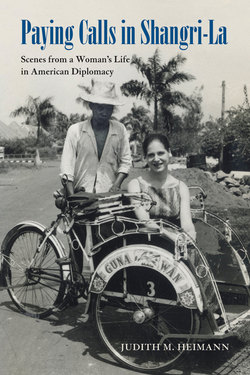Читать книгу Paying Calls in Shangri-La - Judith M. Heimann - Страница 10
На сайте Литреса книга снята с продажи.
ОглавлениеPrologue
Memory is a funny thing. I cannot remember where I left my keys an hour ago. But, if I concentrate, I can clearly remember me at seventeen, standing next to the Christmas tree in our comfortably shabby sixth-floor walk-up apartment on York Avenue in Manhattan. I was standing perfectly still, better to observe my wonderful mother look at twenty-year-old John Heimann. John was a Harvard classmate I had met that fall, and I already suspected he would be my life’s companion.
My mother, a tall, good-looking, clever, and worldly woman, had sought divorce (when I was eight years old) despite what she knew would be our consequent straitened circumstances. She had found she preferred having lovers she could send home, rather than continue being the wife of my father, Warren Moscow. He was a man she liked and respected as a talented journalist, but after years of trying, she found she could not love him enough to give away her independence.
By now (1953), I had long been the person she cared most about in the world. And I could see she was looking at John as someone who very likely would marry me in the next few years. He had made no secret of his plan to take me away to the ends of the earth, as he pursued his dream career as an American diplomat, beginning right after college.
I could read her expressions so well that it was almost as if she said out loud: “This young man is going to take Judy away into worlds where I cannot follow. But he is going to make her happy. It would be wrong for me to try to hold her back.” She looked over at me, and our eyes locked. My gratitude for her generous spirit brought me almost to tears. I promised myself then that I would—at least in letters—let her know, as truthfully as I could, everything that mattered in my life, a life that would be lived so far from hers.
I wrote those letters, and she kept them all; they were returned to me after her death. They form the chief backing for what I describe in this book. They are supplemented by my peculiarly powerful oral memory, which includes conversations from many decades ago, and also poems and hundreds of songs (down through the fifth verse) that I learned, starting before I could read. Undoubtedly, there are misrememberings mixed among my recollections, but I have tried my best to tell the truth as I know it.
My desire, in writing this book—which covers more than a half-century as a diplomat’s wife, career diplomat myself, and rehired retired diplomat—is to let you, the reader, share my discoveries as I made them. I want to let you experience what it was like—and to some extent still is—to go out into the world as a career diplomat or as part of a diplomatic family. I often arrived in the new place with little preparation for living and working there. If, at the start of a chapter, you wonder what was really going on in the place I was living, that is because so was I at the time.
When, after fifteen years as a diplomat’s spouse, I became a diplomat myself, I soon learned that what a career diplomat is supposed to do was something I already loved doing. For me it was a joy to live in a foreign country and get to know many people there. As a career diplomat, I would especially seek out opinion-makers and people who could help me in my efforts to devote serious and sustained attention to what this host country cared about. That way, I could maybe help find a fit with what my country wanted from the host country. Such work is best done out of the glare of the public spotlight, and, if done right, it does not make headlines. But when it is well done, it provides a long-term sense of complicity, even affection, between diplomats like me and our counterparts in the host country. It also can produce a warm feeling that our successors on both sides can draw upon.
Although women have come late to the field, I think many women are well suited to this work. I confess that I have adventurous women especially in mind as I present these memoirs to the reading public. For the reader who wants to know where John and I were and when in our Foreign Service career, I recommend consulting the Appendix on our Foreign Service posts.
I start this memoir with a chapter out of chronological sequence because it shows me making a crucial friendship with an important opinion-maker in his country and on his terms. This man taught me perhaps my single most important lessons about how to be a woman diplomat.
